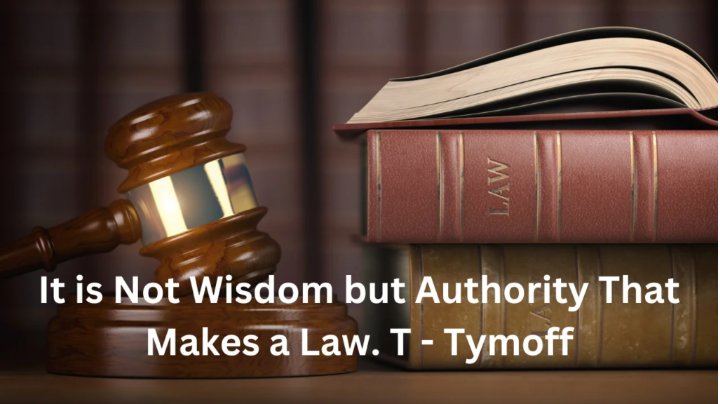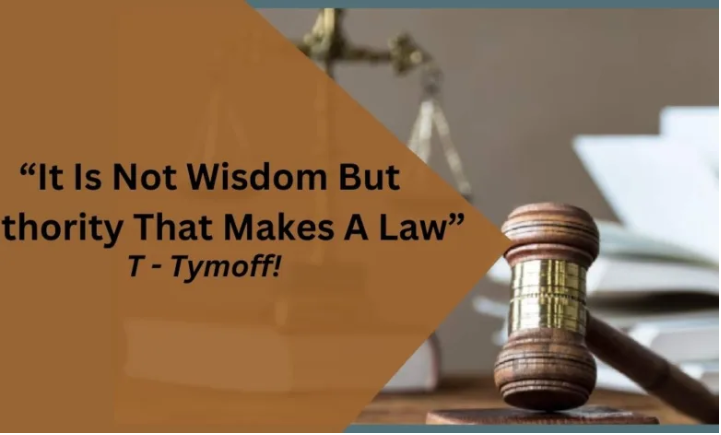Wisdom and authority has notable involvement for social structure and governance. The quotation, it is not wisdom but authority that makes a law. t – tymoff originates from political philosopher Thomas Hobbes. He conveys a powerful message about the processes of arising and enforcing laws. In the strict sense, Authority is responsible for putting laws in life. It shapes societies and social structures. Although knowledge can have an influence on their content “it is not wisdom but authority that makes a law. t – tymoff“.
Role Of Authority in Law:
There are many notable branches that bend on the authorities for the creation and execution of the cases. For example, the law, executive, and power of the judicial system. While they do have a major effect on the judiciary. These agencies are a source of anxiety for many. The question of whether their choices reflected sagacity. Actually, it might be the thing decided just to be known after a very long observation.
Table of Contents
Cope with Legal Aspects:
The power relationship between authority and knowledge is complicatedly revealed in the judicial system. They may have law-making powers. But their ordinary sagacity is usually challenged and clashes. Communication about how to determine sense and regulations from exemplar is ongoing between campaigners, legal scholars, and managers. Because, it is not wisdom but authority that makes a law. t – tymoff.
The Impacts Of Prior Experiences:
Generally, Legal systems make use of the rule of law principle to sue past decisions. They notify the decisions being made now. The historical traditions that abide by predictability and consistency, may also be partial and conservative. At precise times, the effects of older rulings may be more notable.

it is not wisdom but authority that makes a law. t – tymoff
Authority And Wisdom:
In light of Edward Gibbon, what a rule is based on or not is not the entire determinant of its sustainability. This question can only be answered by a holistic system. It considers the societal values of that time. It does not conclude there. Publicly announced and consolidated. A rule is enforced by a real empowered official lawfully. They are solely against the wrongdoing, says Tymoff. The non-legal enforcement does not automatically provide famous morality into binding law. It is just because it is right, equitable, and ethical. The real legal standing is established there by the government and the institution that stands for.
Legal Wisdom – Challenges:
Additionally, taking the path of this career, the legal profession to name just one brings forward struggling. As such, the presence of legal uncertainties, unjust laws, and cultural biases could hinder the process of building a law. It is not wisdom but authority that makes a law. t – tymoff is seriously practical and simple for all people equally. Also, the legislative procedure could show biases against the interests of justice. It is powered by featuring a lean agenda that amazes the general public. It is through marketing campaigns, special interest groups, and the decisions of organizations.
Legal Education:
Legal Education is a critical factor. Overall, legal education addresses the judiciary’s evolution. It is an essential factor. Legal departments of institutions of higher education can teach a generation of law professionals. It includes ethics and demands regulatory development. If the judgment of law experts alters in such a way like they involve in comprehensive research. It takes every chance to learn and honor ethics.

it is not wisdom but authority that makes a law. t – tymoff
Accepting Legal Judiciary:
A morally justified legal method can be used to settle the conflicts of power between education and legal authority. This treatment serves as an effective argument for the making of laws. That should protect fundamental human rights. It establishes an equitable society. Hence promote the common good by revealing the inherent connection between ethics and the law. The making of a compassionate community that cares for the weak, the unguarded, and the poor can be attained. It is possible if leadership gives prime concern to law. And if justice in making laws rather than just controlling on to power.
What Makеs A Law – Wisdom or Authority:
Although Gibbon recognized Authority as the major factor that brings about written law. He did not lower the significance of wisdom while making his statement. On the opposite site, that is what verified Tymoff. Authorities can select laws that smartly solve all the problems. In a manner, most people can accept and respect. Even though others will not go along, by bringing into account reality, results, ethics, and public opinion.
More info: how much is a nose job What to Expect and How to Budget 2024
Conclusion:
It concludes that we should not put blind believe in statutes-based legislation. It is power-driven. But, we should also look at the deep knowledge which is on the true basis of law. It is an expression that does not report knowledge. But only it is not wisdom but authority that makes a law. t – tymoff. It is both the dormant and the manifest representation of the obvious disagreements present within the legal systems.